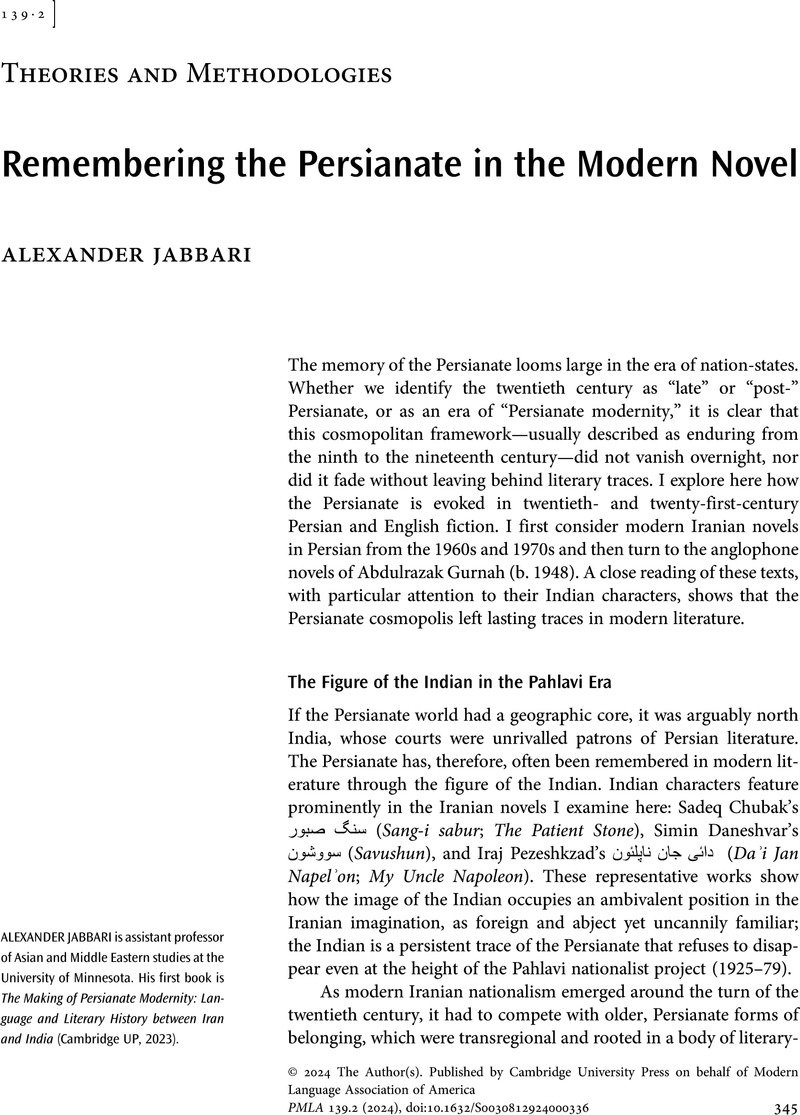No CrossRef data available.
Article contents
Remembering the Persianate in the Modern Novel
Published online by Cambridge University Press: 26 July 2024
Abstract
An abstract is not available for this content so a preview has been provided. Please use the Get access link above for information on how to access this content.

- Type
- Theories and Methodologies
- Information
- Copyright
- Copyright © 2024 The Author(s). Published by Cambridge University Press on behalf of Modern Language Association of America
References
Works Cited
Aʿlam, , Hušang, . “Golāb.” Encyclopaedia Iranica, 2012, iranicaonline.org/articles/golab.Google Scholar
Butler, Judith. The Psychic Life of Power: Theories in Subjection. Stanford UP, 1997.CrossRefGoogle Scholar
Chubak, Sadeq. The Patient Stone. Translated by Ghanoonparvar, M. R., Mazdâ Publishers, 1987.Google Scholar
Daneshvar, Simin. Savushun: A Novel about Modern Iran. Translated by Ghanoonparvar, M. R., Mage Publishers, 2011.Google Scholar
Green, Nile. “Urdu as an African Language: A Survey of Source Literature.” Islamic Africa, vol. 3, no. 2, 2012, pp. 173–99.CrossRefGoogle Scholar
Hodgkin, Samuel. “The Poetics of Persianate Disaffiliation: Recusative Gestures for a Royal Genre.” Philological Encounters, vol. 8, no. 1, 2003, pp. 281–304.CrossRefGoogle Scholar
Jabbari, Alexander. “Saʿdi's Gulistan in British India: A Provocation.” The Routledge Handbook of Persian Literary Translation, edited by Shabani-Jadidi, Pouneh et al., Routledge, 2022, pp. 131–42.CrossRefGoogle Scholar
Kia, Mana. “Indian Friends, Iranian Selves, Persianate Modern.” Comparative Studies of South Asia, Africa and the Middle East, vol. 36, no. 3, 2016, pp. 398–417.CrossRefGoogle Scholar
Kumavie, Delali. “Substantive Gaps and Indian Ocean Entanglements: Reading Abdulrazak Gurnah.” PMLA, vol. 138, no. 2, Mar. 2023, pp. 374–80.Google Scholar
Marashi, Afshin. “Imagining Hafez: Rabindranath Tagore in Iran, 1932.” Journal of Persianate Studies, vol. 3, no. 1, 2021, pp. 46–77.CrossRefGoogle Scholar
Milani, Farzaneh. Veils and Words: The Emerging Voices of Iranian Women Writers. Syracuse UP, 1992.Google Scholar
Pezeshkzad, Iraj. دائی جان ناپلئون [Daʾi Jan Napelʾon]. Entesharat-e Safi ʿAlishah, 1976.Google Scholar
Pickett, James. Polymaths of Islam: Power and Networks of Knowledge in Central Asia. Cornell UP, 2020.Google Scholar
Zia-Ebrahimi, Reza. The Emergence of Iranian Nationalism: Race and the Politics of Dislocation. Columbia UP, 2016.Google Scholar




